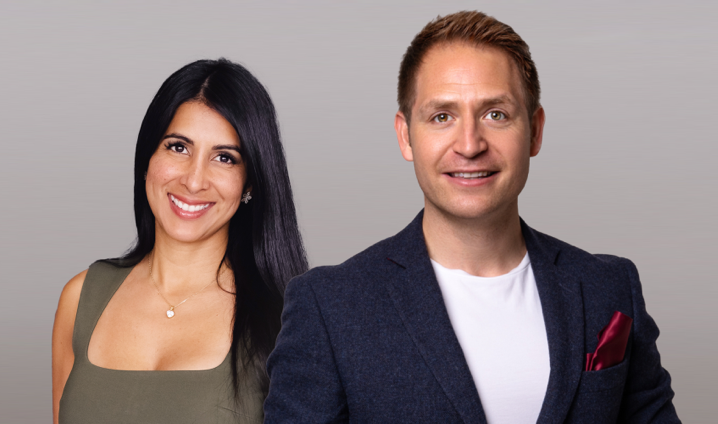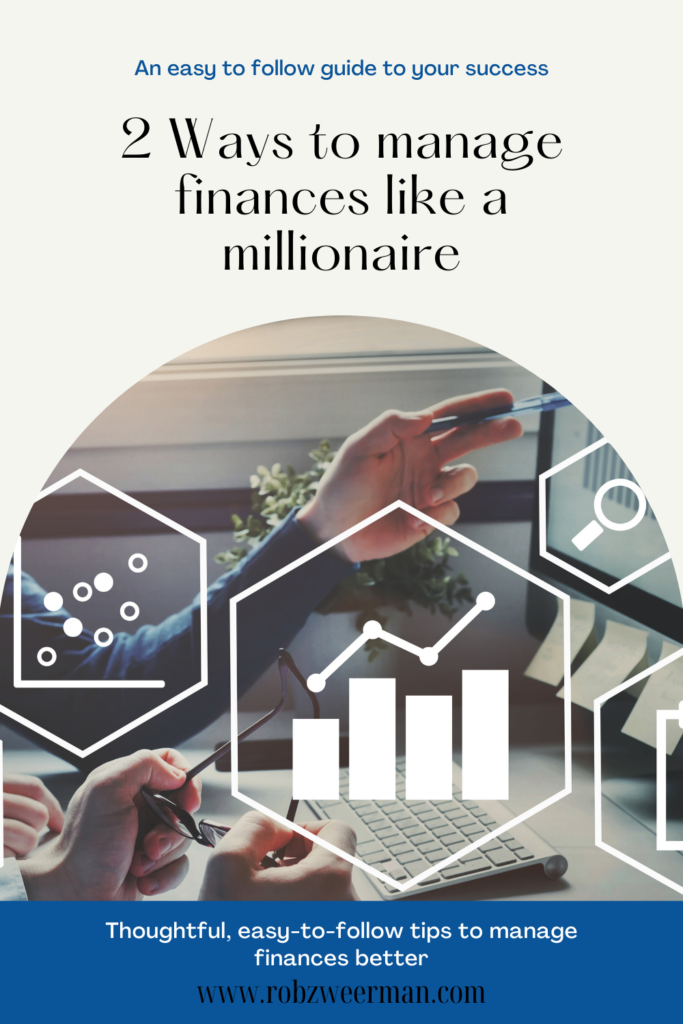2 Ways to Manage Finances like a Millionaire

#1 You are the one giving value to money
Have you ever heard of that? If not, let me explain…
It’s just like you give value to a toilet when you need it.
It’s nothing special, right? What if you go on a trip and you really need to use one…now, it becomes the most important thing you can think about – because you need it. You put value into something where there was little prior.
Now let’s use the example of a savings account:
You can either have the money sitting in a bank account and do nothing or you can put that money to work.
You decide what value to give to money.
You decide whether it’s just a bunch of numbers or decide it’s a little soldier and put it to work to generate more capital.
Here’s how you can make your little soldier work for you – Investments.
Your number one way to manage finance like a millionaire is to use it to invest in something.
Not sure what to invest it in? Grab a complimentary seat on my upcoming inner-circle investment training here
First, determine what kind of investor you are:
You will have different priorities in your 20s than in your 40s or 60s – especially as an investor.
Obviously, the amount of money you invest depends on the amount of income you receive. So, while in your 20s you’d like to start investing, you could start with something as low as 5% to get started. While in your 30s – again, dependent on income, you’d want to save between 10-15% towards investments and retirement plans. The older you get, the more you will want to contribute towards investments.
#2 The money in your bank isn’t actually yours
Going back to #1, you likely have a sense of protection to leave money sitting in your account – but, whoever is telling you that, isn’t telling you, that it isn’t your money sitting there.
It’s the banks. The states. The countries. You name it: it’s someone else’.
Here’s why: when you give money to the banks, they’re liquidating it and loaning it out to others. That’s how loans work. While your number stays the same, your money goes into all different directions.
While, if a bank goes bankrupt, they have an insurance to pay out your money, however, technically, it’s gone.
What now?
Now you know how much you should invest, but how do you know where to invest it?
You have to determine what your investment goal is: is it capital gains? Cash flow? Either one?
You might be familiar with the word capital gains if you are in real estate or if you’ve watched real estate TV shows. It’s when you’re buying a property and then sell it for a profit, meaning, you get out more than you put in.
Same principle for stocks!
If you earn money after selling something, you have a capital gain, while if you lose it, you have a capital loss. However, this isn’t risk-free and rather gambling. So, if the market crashes, you might get stuck with inventory you can’t sell.

Cash flow, on the other hand, is an investment that you use to make regular income. This could also be within the real estate area, where you buy a house, renovate it, and rent it out. This will create a regular revenue. Similarly, when purchasing a stock, you will receive dividends for as long as you own that stock.
Cash flow systems won’t be affected by the market as much, because you’re looking at long term trends.
Not sure which one to pick? Consider enrolling in my free investment master class.
Multiply your surplus
Going back to #1 and #2, while you should save money for a rainy day, you should also invest a portion of that. This contributes towards feeling of playing things safe, not wanting to take risks
However, if you do everything like everyone else does – you will also get the same results as everyone else.
Look at your environment, what do they do? Does it make them happy or wealthy?
If you aren’t sure how to change your attitude about investing, click here to schedule an alignment call to create clarity.
We are being told:
1. Money is worth so much more if you save it and keep it save– don’t waste it
2. If you save it and don’t spend it, no one can take it away
3. Don’t risk
However, what you should be learning and adopt as a mindset is:
1. Money is worth as much as you put value in – invest it
2. Make the money yours, by generating a consistent cycle of revenue
3. Invest all your surplus
I hope this helps and if you still have questions, click here to schedule a free consultation to get you thinking into the right direction, no matter your current situation or background.
If you want more, consider enrolling into my 7-day free trial program, where I will personally coach you and help you make the right decisions by teaching you my investment philosophy.
To your success,
Rob Zweerman
ABOUT THE AUTHOR

Team Rob N. Zweerman
Rob Zweerman has been sharing his expertise on how to achieve financial well-being through his online webinars, podcast, training events, coaching and mastermind programs. He is the founder of various media and education companies. Rob Zweerman continuously seeks out to elevate his own performance by surrounding himself with the industry’s best teachers and mentors that in turn, drives the results of his clients.
Commercial Real Estate Investing
How to Get Started?
Want greater financial flexibility and personal freedom? Learn how to invest in commercial real estate with Rob Zweerman for every experience level and investing strategy.






